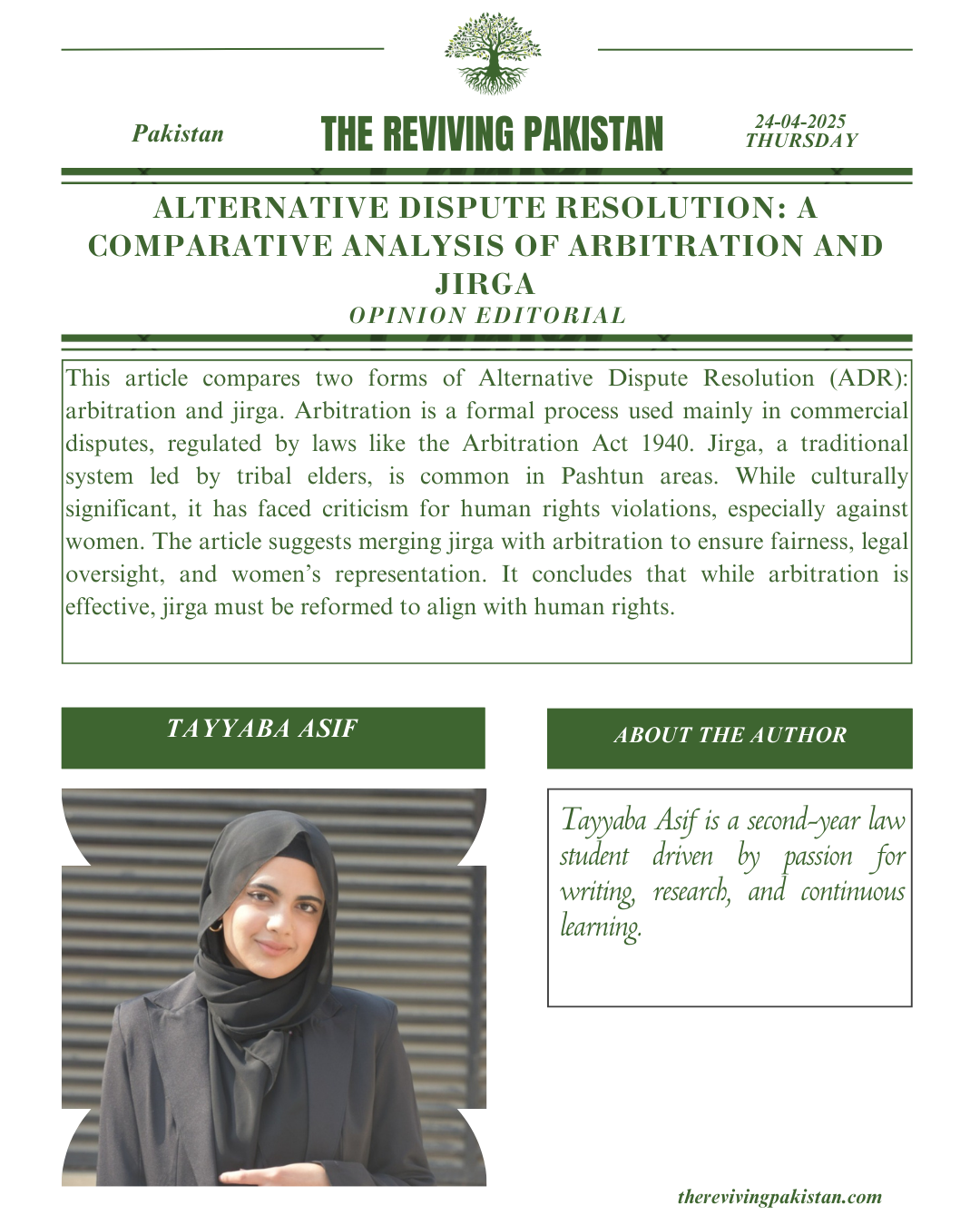
Tayyaba Asif
Tayyaba Asif is a second-year law student driven by passion for writing, research, and continuous learning.
The process of resolving conflicts through court procedures has become lengthy and time-consuming. Consequently, a faster substitute, Alternative Dispute Resolution (ADR), has come into play. ADR is the resolution of conflicts among parties without the use of conventional court procedures. Two of the most common modes of ADR are arbitration and jirga.
Arbitration is a type of ADR where a third party, who does not favor either of the parties, referred to as the arbitrator, listens to both parties and gives a final and binding verdict. Arbitration is most commonly employed in contractual disputes and commercial conflicts. Jirga, however, is a more conventional ADR process that is most commonly followed in Pashtun society. It is made up of a group of elders or community leaders that reaches decisions through consensus, under the direction of the Pashtunwali social code. Such a practice of resolving disputes is also found in other cultural environments, known as a panchayat, where decisions are reached through community customs and traditions.
This article is a critical analysis of these two types of ADR, their approach, societal acceptance, and their pros and cons.
Arbitration
Arbitration as a method of ADR is a widespread phenomenon in the resolution of disputes. In a nation like Pakistan, where courts are overcrowded with cases, alternative means are unavoidable. The ineffectiveness of Pakistani courts in addressing cases has turned arbitration into a golden option for most. As per an article published in Dawn News, 2.6 million cases are pending in the courts of Pakistan. Arbitration is one of the most advanced and well-developed types of ADR. The process of arbitration also has transparency.
Two acts regulate arbitration in Pakistan: The Arbitration Act 1940 and The Recognition and Enforcement Act 2011. Arbitration is widely practiced in commercial and industrial disputes. There are two types of arbitration: one with the influence of courts and the other without court intervention.
The Arbitration Act 1940 is primarily used for arbitration in Pakistan. The act has different sections dealing with various procedures. There are separate sections for agreements, modes of appointment, the power of arbitrators, proceedings, and arbitral awards, which are binding on both parties. The most advantageous and effective aspect of arbitration is its enforceability. However, courts can intervene if the arbitrator has exceeded their jurisdiction, if the decision is against public policy, or if fraud is involved—these are exceptions. The general rule is that courts are not supposed to intervene in the arbitration process and have no jurisdiction to overturn the judgment.
The enforceability of arbitral awards can be seen in the case of Kausar Rana Resources (Private) Limited v. Qatar Lubricants Company W.L.L. (QALCO), where the issue of arbitration enforceability and the role of courts was discussed. The Supreme Court, in this case, emphasized that the role of courts is not to interfere with the jurisdiction of arbitration. The courts’ role is to uphold arbitration agreements unless there are strong reasons not to do so.
Hence, arbitration is a convenient method that saves parties from the distress of court proceedings. It is an efficient method that allows parties the right and power to draft and tailor agreements accordingly. The parties can select the arbitrators and set rules and regulations. One downside of arbitration is its cost. It is not cost-efficient. For an average Pakistani—for example, a shopkeeper—the fees and process of arbitration are not reasonable. Despite being costly, arbitration remains a very popular and effective form of dispute resolution.
Jirga
Unlike arbitration, another form of conflict resolution in Pakistan is jirga. Jirga is a traditional system by which disputes are settled, and binding decisions are made by elders in a tribe. Unlike arbitration, where the parties mutually appoint an arbitrator, in a jirga, the elders are selected from various tribes according to tribal traditions and customs. The procedure differs in different places, as different regions have their own customary laws regulating the procedure in the jirga.
A normal process of jirga entails an initial hearing during which both sides place their facts before the court, followed by an investigation and a final determination by the elders. Jirgas have been a way of addressing disputes, particularly in tribal areas, for a long time. This is evident in the background of ex-FATA, where the government used to have the Frontier Crimes Regulation (FCR) in place for years so that jirgas could be a recognized form of justice.
Although historically significant, jirga is still one of the most criticized and controversial forms of dispute resolution. It has been universally criticized for being against human rights and has even been ruled unconstitutional by Pakistani courts. Nevertheless, in practice, jirgas still exist, especially in rural communities, where their decisions still hold considerable weight. Regrettably, marginalized groups, particularly women, are usually the direct victims of jirga judgments. Inhumane and unjust decisions are often reported, such as:
- 2002: A jirga instructed the gang rape of Mukhtar Mai as punishment for her brother’s suspected infidelity. The case elicited international outrage.
- 2011: A woman was paraded naked as a punishment for her son’s suspected offense.
- 2014: An 11-year-old girl was married off as reparation for her uncle’s offense.
- 2015: A Diamer district jirga withheld voting rights from more than 12,000 women.
- 2020: A jirga attempted to wed a 13-year-old girl to a 41-year-old man in a case of Swara—a tradition where girls are betrothed in marriage to end feuds. This was prevented by the police.
These instances highlight the discriminatory and inhumane character of most jirga decisions. A system meant for speedy and community-oriented justice has, in most cases, become an instrument of oppression with excessive dependence on traditional practices. Considering these issues, the government has proposed merging the jirga with arbitration, ensuring a more formal and fairer process of conflict resolution. Combining a jirga with arbitration would establish an equitable system of settling civil cases while maintaining justice and legal checks. It would bring in professional arbitrators to accompany elders in order to eliminate bias and ensure justice. Representation of women would be guaranteed to safeguard them from discriminatory judgments. Nevertheless, criminal cases should not be dealt with by jirgas since they need to follow proper legal processes under state law
Conclusion
In conclusion, alternative dispute resolution has gained great popularity. The most renowned among them are arbitration and jirga. Arbitration, being a flexible process, is an appropriate means of resolving disputes, whereas the process of jirga requires reforms. It must be parallel to human standards, as it is the sole process. Jirga, being an ancient and significant process, can continue to be important if it takes into account human rights standards.
REFERENCES:
- Dawn News, “July-Dec 2023 Statistics Show 2.26 million Cases Pending in Courts: Report,” Dawn, February 22, 2024, .sw/we.
- C.P.L.A. 4468/2024. Supreme Court of Pakistan, 2024
- Government of Pakistan, The Arbitration Act, 1940, Pakistan Code, https://pakistancode.gov.pk/english/index.php.
- Zubair Torwali, “Jirga is a Transgression of Human Rights,” The News, January 22, 2023, https://www.thenews.com.pk/tns/detail/1032557-jirga-is-a-transgression-of-human-right.
- “Pakistan Gang-Rape Victim Speaks Out,” BBC News, August 22, 2002, https://news.bbc.co.uk/2/hi/south_asia/2208754.stm.
Pakistan Woman Paraded Naked by Villagers,” BBC News, June 21, 2011, https://www.bbc.com/news/world-south-asia-13847296

